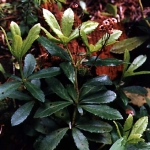| Common Name: |
Pipsissewa |
| Other Names: |
Bitter Wintergreen, Ground Holly, King's Cure, Prince's pine, Rheumatism Weed, Wintergreen |
| Botanical Name: |
Chimaphila umbellata |
| Genus: |
Chimaphila |
| Family: |
Ericaceae |
| Native Location: |
Eastern N America, N and C Europe, N Asia, Japan |
| Cultivation: |
Moist, well-drianed, acid sandy soil in shade or dappled shade. Difficult to establish. |
| Propagation: |
By seed sown in autumn; by division in spring. |
| Harvest: |
Whole plants are picked when in flower, and leaves during the growing season; both are dried for infusions and liquid extracts. |
| Height: |
10-25cm (4-10in) |
| Width: |
20cm (8in) |
| Hardiness: |
Z4-7 |
| History: |
Pipsissewa's botanical name means "winter love", from the Greek cheima, for "winter", and phileo, for "love", and is an oblique reference to the fact that the plant remains green year round, including during the winter, which makes it prized ground cover on lawns and in gardens. "Pipsissewa" is the Native American name for the plant and means "break into pieces", a reference to the belief that the herb could "break up" kidney stones. The herb was used extensively by Native Americans and early American settlers to treat fever, kidney ailments, rheumatism, and typhoid. The eighteenth-century Pennsylvania Dutch made pipsissewa famous as a general tonic and it has long been an ingredient in many commercial root beers. It is considered on the best of the diuretic herbs for long-term use, because it is less astringent (drying) than most diuretics and gentler on the kidneys. |
| Parts Used: |
Whole plants, leaves. |
| Chemical Constituents: |
Arbutin
Chimaphilin
Chlorophyll
Ericolin
Minerals
Pectic Acid
Tannins
Ursolic Acid
|
| Properties: |
A bitter, astringent, diuretic herb that has tonic effects on the kidneys and spleen. |
| Known Effects: |
Helps body dispose of excess fluid by increasing amount of urine produced
Interferes with the absorption of iron and other minerals when taken internally
|
| Possible Additional Effects: |
May treat indigestion or mild stomach upsets
May treat irritation of the urinary tract (Kidney, bladder, urethra)
|
| Medicinal Uses: |
Internally for urinary infections, prostatitis, urethritis, kidneys stones, urethritis, kidney stones, arthritis, and rheumatism.
Pipsissewa has alterative, astringent, diuretic, and sweat-promoting properties. It is taken internally for arthritis, bladder and kidney ailments, scrofula (swollen lymph nodes), and rheumatism. Pipsissewa is applied externally, in poultices, to treat abscesses, blisters, boils, burns, sores, and swellings. |
| Preparation: |
Pipsissewa is available as dried herb and in capsules, teas, and tinctures. To make a tea, pour 1 cup of boiling water over 1 teaspoon of dried herb and steep for 5 minutes. Strain, and allow to cool. Drink up to 1 cup a day, 2 tablespoons at a time. |
| Warnings and Precautions: |
Don't take if you:
Are pregnant, think you may be pregnant, or plan pregnancy in the near future.
Have any chronic disease of the gastrointestinal tract, such as stomach or duodenal ulcers, reflux esophagitis, ulcerative colitis, spastic colitis, diverticulosis, or diverticulitis
Consult your doctor if you:
Take this herb for any medical problem that doesn't improve in 2 weeks (There may be safer, more effective treatments.)
Take any medicinal drugs or herbs including aspirin, laxatives, cold and cough remedies, antacids, vitamins, minerals, supplements, other prescription or non-prescription drugs
Pregnancy:
Dangers outweigh any possible benefits. Don't use.
Breastfeeding:
Dangers outweigh any possible benefits. Don't use.
Infants and Children:
Treating infants and children under 2 with any herbal preparation is hazardous.
Others:
None are expected if you are beyond childhood, under 45, not pregnant, basically healthy, take it only for a short time and do not exceed manufacturer's recommended dose.
Storage:
Store in cool, dry area away from direct light, but don't freeze.
Store safely out of reach of children.
Don't store in bathroom medicine cabinet. Heat and moisture may change the action of the herb.
Safe Dosage:
Consult your doctor for the appropriate dose for your condition.
|
| Adverse Reactions, Side Effects, or Overdose Symptoms: |
| Signs and Symptoms |
What to Do |
|
| Diarrhea |
Discontinue. Call doctor immediately. |
| Nausea or Vomiting |
Discontinue. Call doctor immediately. |
| Skin eruptions |
Discontinue. Call doctor when convenient. |
|
| Culinary Uses: |
A traditional ingredient of root beer. |
| Bibliography: |
Encylopedia of Herbs by Deni Brown Copyright ©: 1995, 2001 Dorling Kindersley Limited pp 166-167
The Modern Herbal Primer by Nancy Burke Copyright©2000 Yankee Publishing, Inc. pp 89-90
Vitamins, Herbs, Minerals & Supplements The Complete Guide by H. Winter Griffith, MD Copyright©1998 Fisher Books pp. 412-413 |

